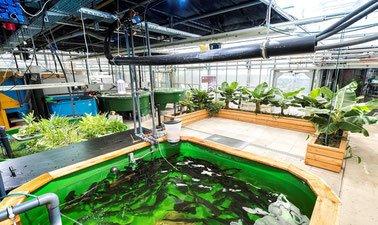MOOC List is learner-supported. When you buy through links on our site, we may earn an affiliate commission.

MOOC List is learner-supported. When you buy through links on our site, we may earn an affiliate commission.
Aquaponic technology continues to attracts a lot of attention around the globe, especially in the context of urban farming. But how exactly does an aquaponic system work and more important what knowledge do I need to successfully run an aquaponic system?
In this course you will obtain answers to these questions. The curriculum will give you an understanding of central topics in the field of aquaponics. Aquaponics is a circulation technology based on a broad knowledge base: from water chemistry, fish and plant physiology, to engineering and microbiology. It can thus serve as a learning model for inter- and transdisciplinary thinking and acting.
This course is for:
- Everyone interested in Aquaponics with a basic understanding of natural sciences (Biology, Chemistry, Physics) on undergraduate degree level
- Professionals in the sector of Aquaculture and Hydroponics
- Aquaponic practitioners who want to gain additional knowledge on specific topics
What you'll learn
- Understand the basic technology principle behind aquaponics, assess the advantages and disadvantages of aquaponic systems and get a vision of potential applications in terms of Urban Agriculture and Urban Farming.
- Get familiar with basic concepts of fish welfare and fish nutrition, especially in terms of practical aspects related to fish feeds and feeding schedules.
- Understand the principles of fish cultivation in recirculating aquaculture systems (RAS), its needed technical components and the important role of water treatment and monitoring.
- Understand basic plant anatomy, physiology, and growing requirements. Be able to calculate the nutrient water balance and the required amounts of nutrient supplementation.
- Understand the basic principles of hydroponics and its different cultivation systems. Become familiar with plan varieties suitable for aquaponic systems, learn about the key factors of integrated pest control and how to monitor plants.
- Know how to assemble the basic components of an aquaponic system, and understand the importance of water flow from one component to another. Be able to plan and design an aquaponic system yourself.
Syllabus
To run an aquaponic system you need broad knowledge ranging from water chemistry, fish and plant physiology, to engineering and entrepreneurial thinking. Therefore, the course is structured into six main topics:
Basic Principles of Aquaponics
Basics of Aquaponics; Opportunities, Risks, Challenges, and Limitations; Aquaponics and Urban Agriculture, a global perspective
Aquaculture Part 1
Fish Anatomy and Physiology; Feeding and Growth; Fish Health and Welfare in Aquaculture
Aquaculture Part 2
Recirculating Aquaculture System (RAS) Engineering; Management; Calculations
Hydroponic Part 1
Hydroponic Systems; Plant Anatomy, Physiology and Growth Requirements; Nutrient Supply
Hydroponic Part 2
Plant Varieties; Plant Monitoring; Integrated Pest Management (IPM)
Aquaponic System Design and Calculation of Dimensions
System Design and Planning; Calculating the Dimensions of your Aquaponic System
To enhance your learning, you will have access to videos, course literature, forum contributions, discussions, practical sessions, individual work, and quizzes. In week 6, as a project, you will design an aquaponic system and calculate its dimensions.
Prerequisites:
This course is for:
- Everyone interested in Aquaponics with a basic understanding of natural sciences (Biology, Chemistry, Physics) on undergraduate degree level
- Professionals in the sector of Aquaculture and Hydroponics
- Aquaponic practitioners who want to gain additional knowledge on specific topics
MOOC List is learner-supported. When you buy through links on our site, we may earn an affiliate commission.
MOOC List is learner-supported. When you buy through links on our site, we may earn an affiliate commission.
